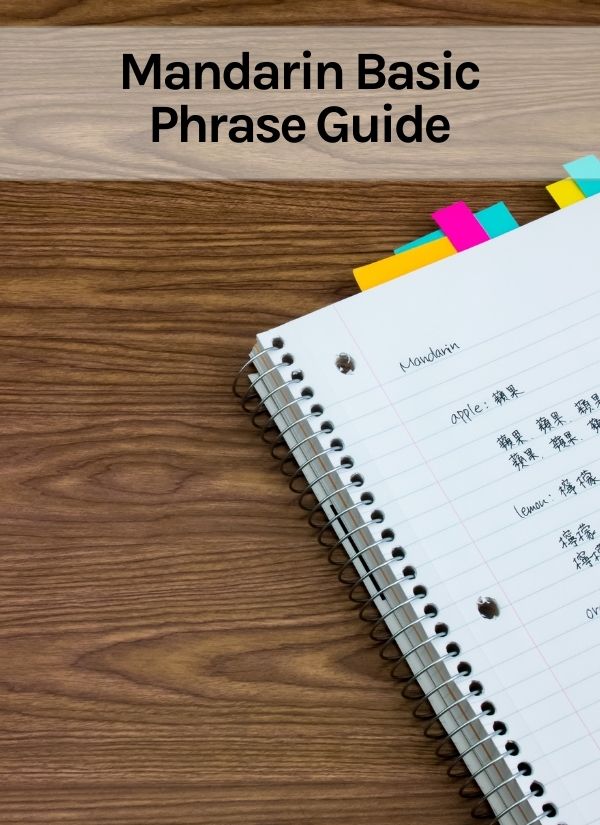If you’ve ever considered teaching English in China, there’s a lot to learn, from finding a position to arranging a work visa. But you’ll also need to think of another thing: speaking the language of your new home. After all, you’ll be there for 1 to 2 years! Plus, there are a lot of benefits that come with learning a new language!
Teachers living in China will need to adopt a normal routine for things like grocery shopping, traveling to work, and meeting new people. Of course, this can be overwhelming because Mandarin Chinese, the most common language spoken in China, is very different from most Latin-based languages, like English.
To help you navigate your stay in China, you’ll need to learn some essential Mandarin phrases to get by. We’ve gathered a few handy phrases, as well as some of their pronunciations, to help you while you’re teaching abroad.
Conversational
Getting around your new neighborhood and school, you’ll want to be able to have at least a basic conversation. Here are a few essential phrases to get you started:
Hello! –Nǐ hǎo (Nee how) 你好
“Hello” in Mandarin uses the words “you” and “good.” To make this sentence a question so you can ask “How are you?” you simply add the character ‘吗‘ (ma)
How are you? – Nǐ hǎo ma (Nee how ma) 你好吗?
Not OK/ Not Good – Bù hǎo (Boo how) 不好
I don’t understand – Wǒ tīng bù dǒng (Wah tieng boo dong) 我听不懂。
Thank you! – Xiè xie (Shieh shieh) 谢谢
You’re welcome – Bié kèqì (Boo ke chee) 别客气
I’m sorry/excuse me (coming through) – Duìbùqǐ (Doo-ay boo chee) 对不起
Excuse me (getting attention) – Qǐng wèn (Ching when) 请问
Do you speak English? – Nǐ huì shuō Yīngyǔ ma? (Nee hoy shuah yung-ooh ma) 你会说英语吗?
How much money? Duōshǎo qián (Dua shao chien) 多少钱
I don’t want it! (useful for people who come up trying to sell you something) – Wǒ búyào! (Whoa boo-yao) 我不要
Goodbye – Zàijiàn (Dzai jee-en) 再见
This literally translates to “see you again” and is the most common way to say goodbye in China, but there are many other ways as well!
Directions
Of course, getting lost in a foreign country is no fun. Keep these phrases in mind if you’re out exploring.
Where is the bathroom? – Xǐ shǒu jiān zài nǎ lǐ? (She sho za na li) 洗手间在哪里?
Where is the nearest subway station? – Lí zhè zuìjìn de dìtiě zhàn zài nǎ? (Li juh zuh jin suh-chin dee di-tuh chan zay nah) 离这最近的地铁站在哪?
Where is the nearest bus station? – Zuìjìn de gōngjiāo chē zhàn zài nǎlǐ? (Suh-chin de gung-chao chuh jan za na-lee) 最近的公交车站在哪里?
Where is the nearest bank? – Zuìjìn de yínháng zài nă? (Suh-chin de ying-haung zay nah) 最近的银行在哪?
Dining
One of the best parts of living in China is undoubtedly the food. But if you don’t know how to speak with your waiter, it’s going to be difficult! Here are some basic phrases to help you get through your meal:
How many people? – Duōshǎo rén (Do shaow rin) 多少人
Your waiter may ask you this when you first enter the restaurant. Learn your Mandarin numbers so you can be prepared to answer.
Waiter – Fú wù yuán (Foo wreah) 服务员
Traditionally, customers will yell “waiter” to get his or her attention. Learn more about Chinese dining customs.
I would like… – Wǒ yào… (Wuh yao) 我要
Water – Shuǐ (Shwu-ee) 水
Do you have chopsticks? – Yǒu kuài zi ma (Yo kwah-zee mah) 有筷子吗?
Do you have spoons? – Yǒu shǎo zi ma (Yo shaow zee mah) 有勺子吗?
In case you’re not quite familiar with using chopsticks, this is a great phrase to help you enjoy your meal while you learn.
The bill, please. Thank you. – Jié zhàng, xiè xie (Ge-uh chawng, shieh shieh) 结账,谢谢。
Classroom
Of course, if you go to China to teach English, you’ll need to be able to speak some Mandarin to your students. Here are some common classroom phrases you may find helpful in your first days:
Look at the teacher – Kàn lǎoshī (Khan low shir) 看老师
Listen to the teacher – Tīng lǎoshī (Ting laoshi) 听老师
Please turn in your homework – Qǐng shàng jiāo nǐ de zuòyè (Ching shawng jaow nee de zoy-yuh) 请上交你的作业
Mandarin is a complex language and one that will take time to learn. But once you have a few basic phrases under your belt, you’ll feel more confident in your abilities — and in your classroom. As you prepare for your teaching adventure in China, Teaching Nomad has all the resources you need for a seamless transition – browse our guides today!
Don’t forget to memorize numbers!
0 〇 (零) líng
1 一 (壹) yī
2 二 (贰) èr (两 liǎng is used when specifying quantities)
3 三 (叁) sān
4 四 (肆) sì
5 五 (伍) wǔ
6 六 (陆) liù
7 七 (柒) qī
8 八 (捌) bā
9 九 (玖) jiǔ
10 十 (拾) shí
Check out teaching jobs in China
Download our Mandarin basic phrase guide:


